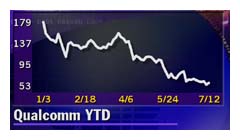|
Korean handset sales plunge
|
 |
July 12, 2000: 2:27 p.m. ET
Sales reported to plunge by 84 percent after government removes subsidy
|
NEW YORK (CNNfn) - Mobile phone handset sales plunged in June in Korea after the nation eliminated government subsidies for handsets, according to a Korean newspaper and a prominent mobile communications analyst.
Analysts have been concerned for several weeks that the elimination of handset subsidies in Korea could hurt Qualcomm Inc., the dominant provider of chips used in mobile phones in North America and other parts of the world. On June 28, after its stock had already declined precipitously, Qualcomm (QCOM: Research, Estimates) publicly admitted that its orders from South Korea may slow.
Reports issued by The Electronic Times, a Korean trade newspaper, and CS First Boston analyst Marc Cabi indicate that the decline in handset sales could be even more severe than previously anticipated.
 The Korean newspaper reported that mobile phone handset sales in that country plunged 84 percent in June, versus the average monthly sales in January through May. The newspaper estimates that 272,000 handsets were sold in Korea in June. By contrast, CS First Boston's Cabi estimates that monthly handset sales averaged 1.72 million units in January through May. The Korean newspaper reported that mobile phone handset sales in that country plunged 84 percent in June, versus the average monthly sales in January through May. The newspaper estimates that 272,000 handsets were sold in Korea in June. By contrast, CS First Boston's Cabi estimates that monthly handset sales averaged 1.72 million units in January through May.
"During our visit with companies in Korea, each company acknowledged that June revenues for handsets dropped drastically, although they did not agree with the degree to which it dropped," Cabi said in a research note issued Wednesday.
"We expect a potentially heavy impact on Qualcomm, especially for second quarter results," Cabi said. "We estimate that Qualcomm would have derived more than 25 percent of its revenue from Korea this year. We remain cautious on Qualcomm shares."
Qualcomm's stock already affected
Qualcomm makes mobile phone chipsets based on Code Division Multiple Access, or CDMA, technology and also licenses that technology to other makers of mobile phones. The CDMA standard competes with one called Time Division Multiple Access, or variations of TDMA known as Global System for Mobile Communications (or GSM). CDMA was adopted as the standard in the United States in 1993, but GSM is commonly used in Asia and Europe.
Of the 57 million users of CDMA-based phones in the world, about 28 million are in Korea, analysts estimate.
The company said on June 28 that, based on recent feedback from South Korean customers and operators, it may experience "modestly lower order levels for its chipsets in the fourth quarter of fiscal 2000 due to an anticipated decrease in domestic South Korean phone sales" because of an end to government phone subsidies. Company spokeswoman Christine Trimble declined to comment Wednesday beyond that statement.
The company's stock fell sharply on June 14 and 15, losing about 20 points in two sessions, after analysts warned about lower chipset sales in South Korea. So the impact of Qualcomm's South Korea woes is already priced into the stock to a certain extent. The company is scheduled to release its quarterly earnings on July 19.
Separately, Qualcomm stock jumped 4-5/8 to 57-5/8 Wednesday after announcing after the close Tuesday that it entered into a CDMA worldwide subscriber unit license agreement with Cherish Telecom, headquartered in Taipei, Taiwan. Qualcomm described the agreement as "multimillion-dollar" and "royalty-bearing." 
|
|
|
|
|
 |

|

